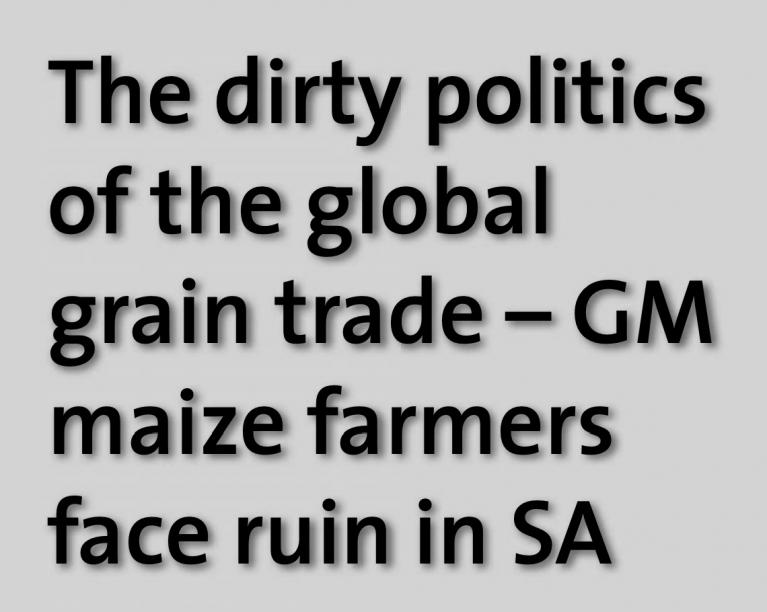Latest Resources

31 January 2011
ACB comments on Regulations to the Consumer Protection Act related to labelling of Genetically Mo...
Download the Report.

10 November 2010
Opposition to Pioneer Hi Bred’s merger with Pannar, submitted to Competitions Commission
As a stakeholder, the ACB was requested by the Competition Commission to make written comments on the proposed merger between Pioneer Hi Bred and Pannar, which we submitted to the Commission on the 21st of October, 2010. In this submission, we raise the following further pertinent issues: We provide in several annexes, the seeds under […]

19 October 2010
ACB Submission to the Department of Trade and Industry on the Intellectual Property Amendment Bil...
The Intellectual Property Amendment Bill aims to strengthen intellectual property rights relating to traditional performances, traditional work, traditional terms of expressions and traditional designs. The Bill has been widely condemned as sounding the death knell for traditional knowledge as it attempts to provide protection for Traditional Knowledge (TK) within a western intellectual property regime, originally […]

8 September 2010
The dirty politics of the global grain trade – GM maize farmers face ruin in SA
Recently, the South African press reported on the possible bankruptcy faced by maize farmers. The African Centre for Biosafety (ACB) has today released a new report titled “The dirty politics of the global grain trade – GM maize farmers face ruin in SA” which provides an analysis of why South Africa’s record 13 million ton […]

3 September 2010
EIA regulations and GMOs in South Africa
The African Centre for Biosafety (ACB) has done considerable work with regard to the need for environmental impact assessments of GMOs and the limitations of current legislation. This work can be found on the ACB’s website. We have perused the new Environmental Impact Assessment (EIA) Regulations, regulating procedures and criteria for conducting EIAs as set […]

13 August 2010
GM Sorghum: Africa’s Golden Rice
In this paper, we critically analyse the African Biofortified Sorghum (ABS) project, a GM ‘poster project’ in Africa. We dig beneath the veneer of the project being an “African led solution” to poverty and malnutrition on the continent. We also focus attention on the myriad of sorghum research initiatives currently underway in Africa, using both […]

13 July 2010
Comments on COMESA’s Draft Policy on GMOs
The African Centre for Biosafety (ACB) was very recently handed a copy of the Common Market for Eastern and Southern Africa’s (COMESA) ‘Draft policy statements and guidelines for commercial planting of GMOs, Trade in GMOs and Emergency Food aid with GMO content’. Having perused the policy we are alarmed and outraged that COMESA appears to […]

6 July 2010
Letter re South Africa’s non-compliance with information sharing requirements of the Cartag...
This is our third appeal to the Minister of Agriculture to comply with obligations under the Cartagena Protocol. This document lays out our concerns to the Minister and details the minimum requirements for information on GMOs that must be posted to the Biosafety Clearing House (BCH) according to the Protocol. It highlights the shortfalls in […]

12 May 2010
Traceability, segregation and labelling of genetically modified products in South Africa: A Posit...
South Africa has promulgated national legislation, the Consumer Protection Act (CPA), which creates an opportunity for the mandatory labelling of certain foodstuffs containing or which are genetically-modified organisms (GMOs). The Act sets out a number of consumer rights that have relevance to the sale of products with genetically modified components. These include the right to […]

17 April 2010
Scottish Parliament Motion on GM entry refusal, Kenya, South Africa
*S3M-6119 Bill Wilson: Biodiversity Coalition Opposes GM Contamination. That the Parliament notes reports that 40,000 tons of genetically modified (GM) maize from South Africa have been refused entry to Kenya as a result of protests led by the Kenya Biodiversity Coalition. Further notes, with reference to motion S3M-05873 by Bill Wilson ‘Who Benefits from GM […]
